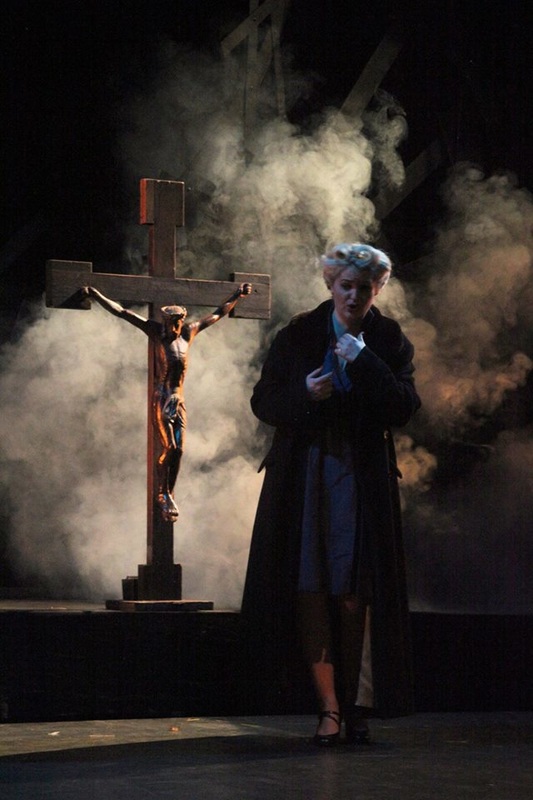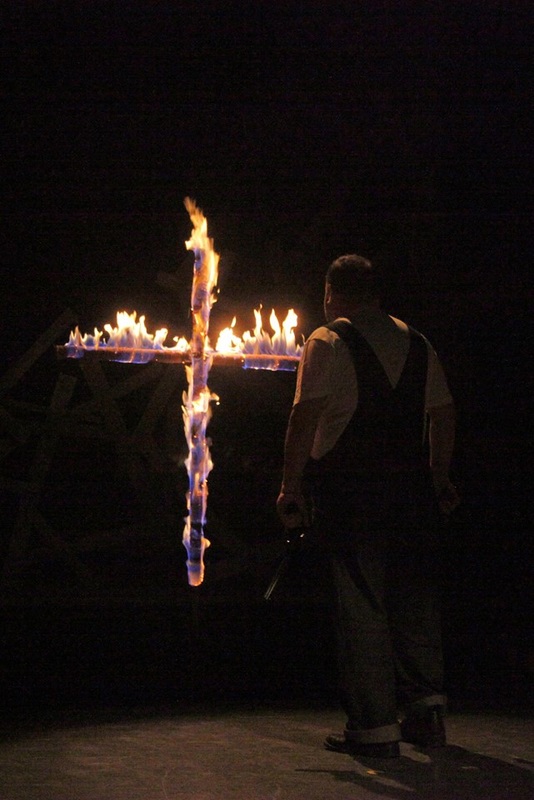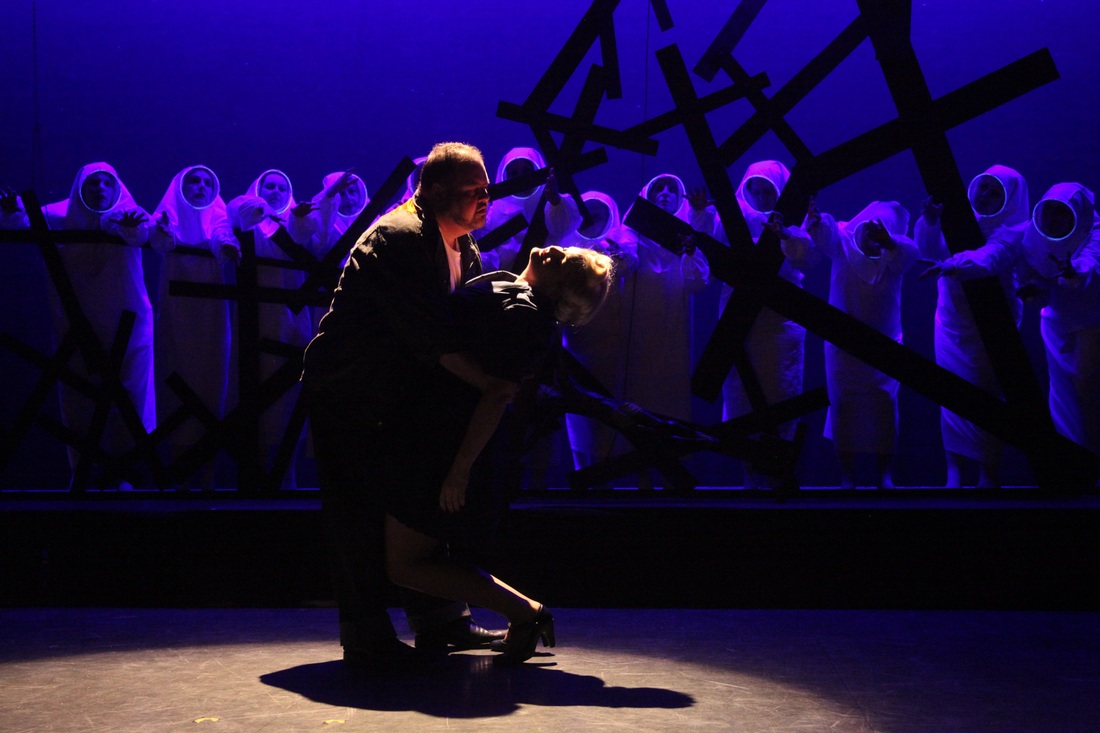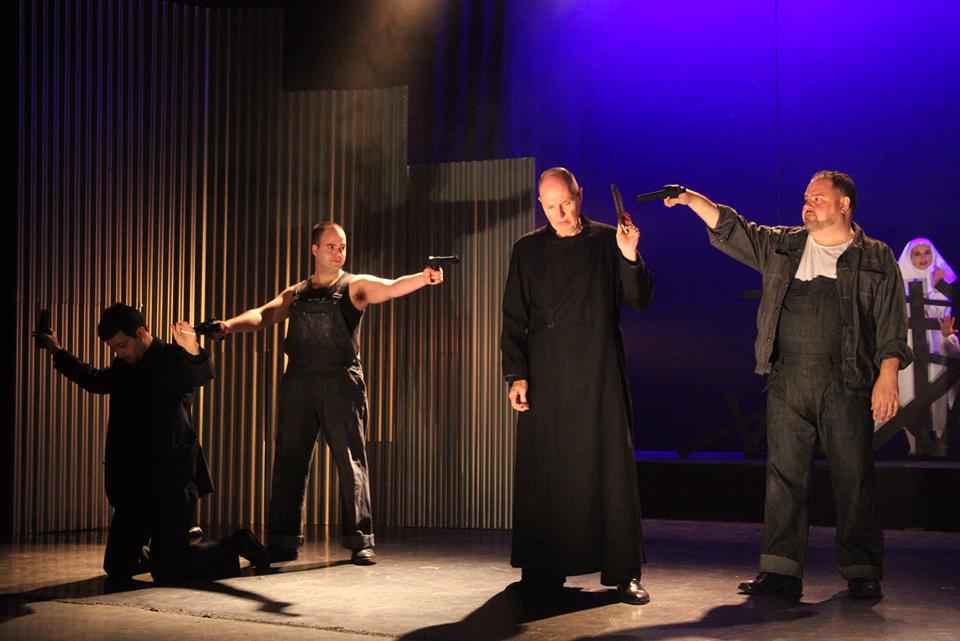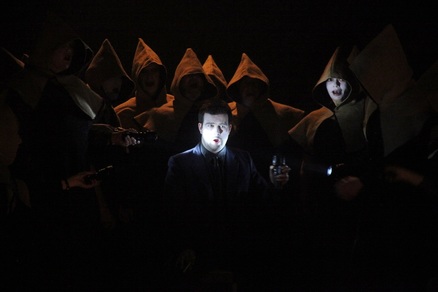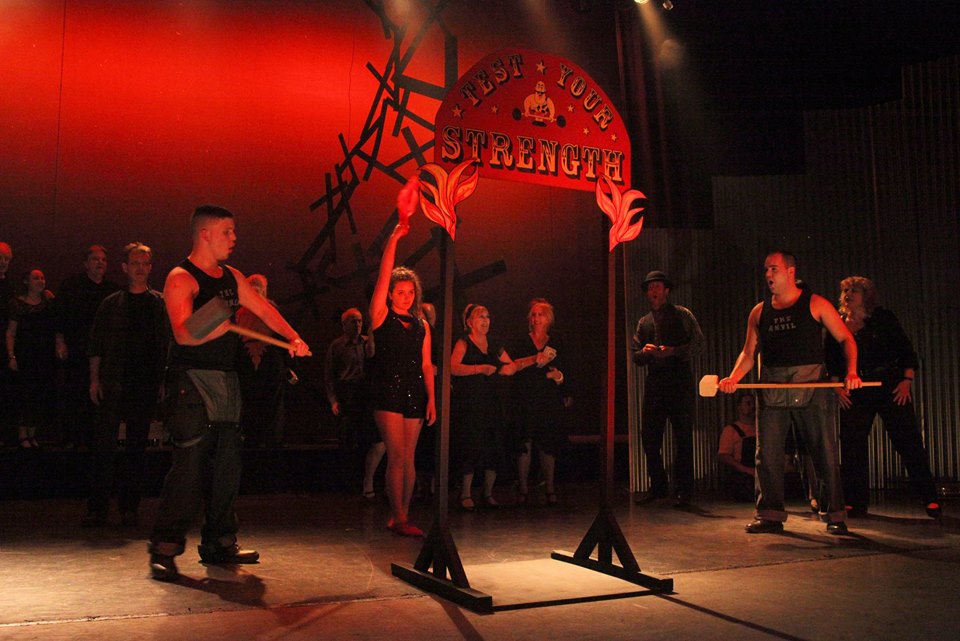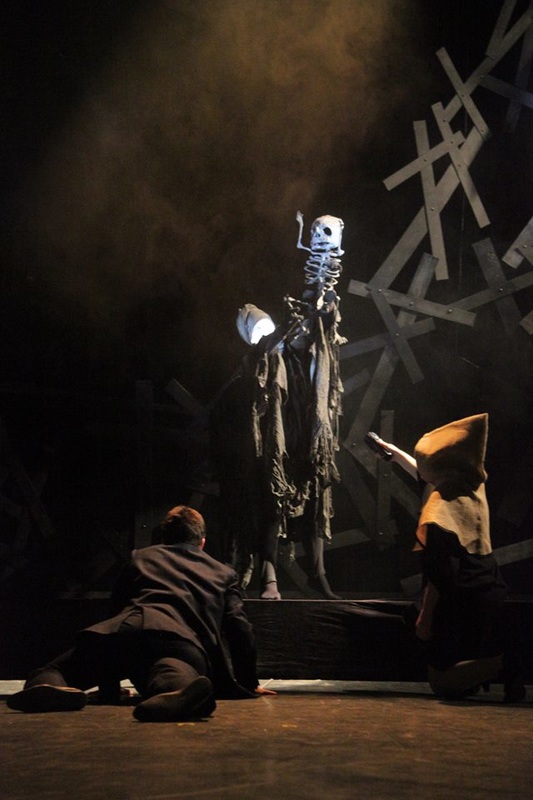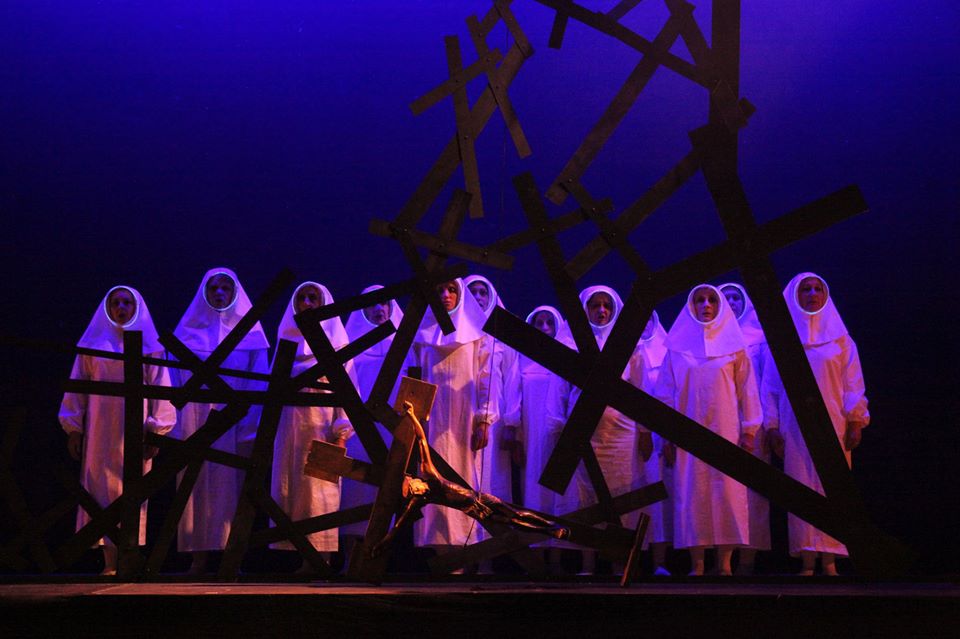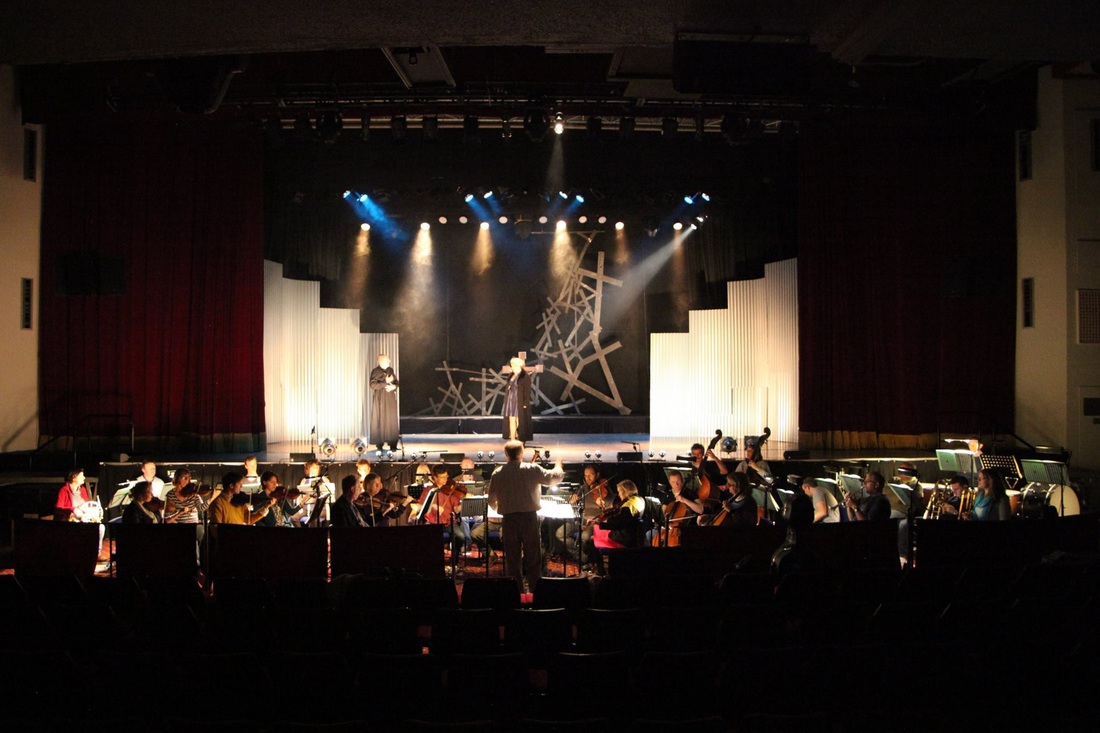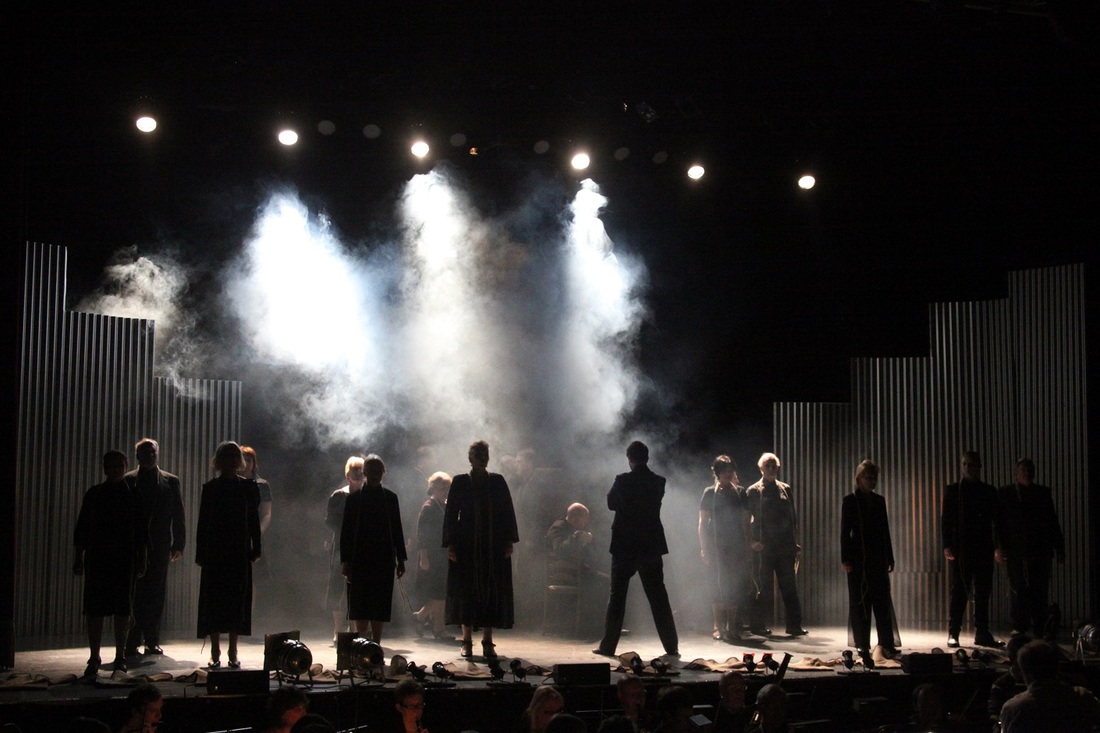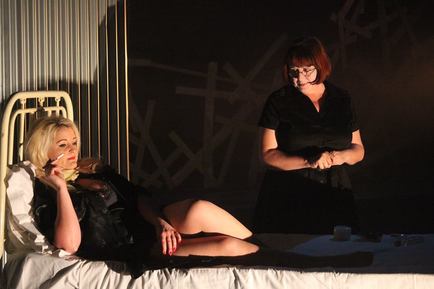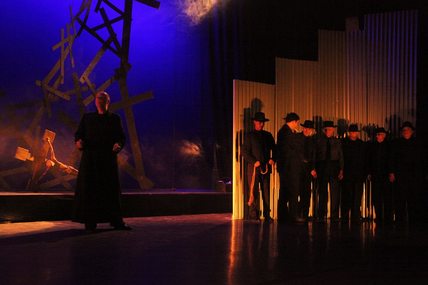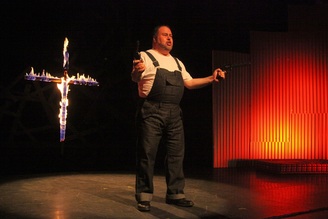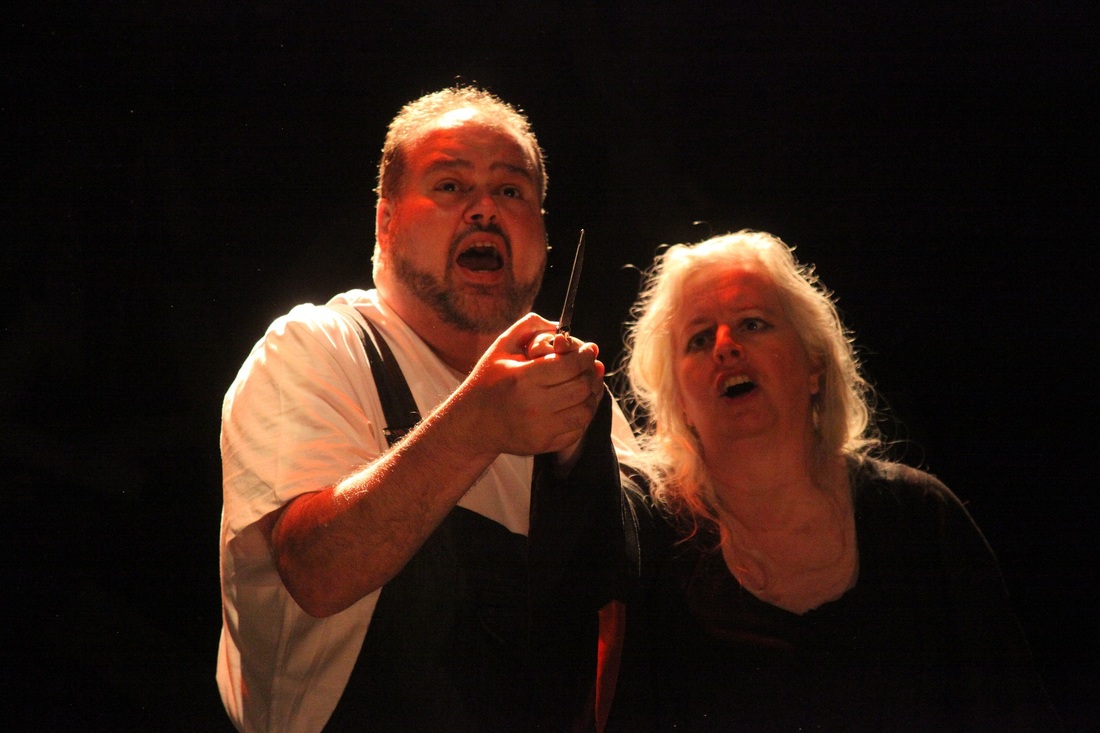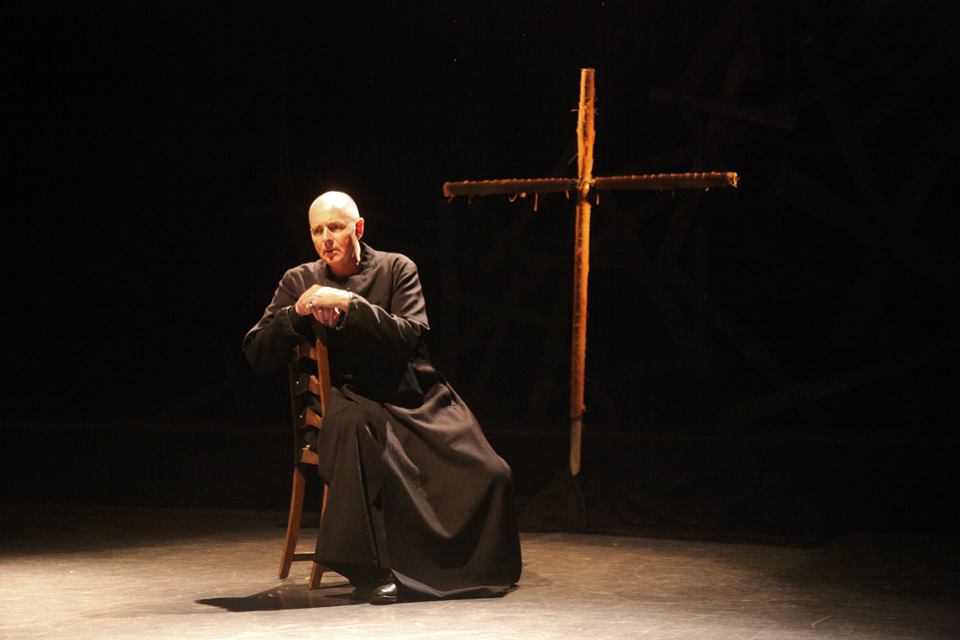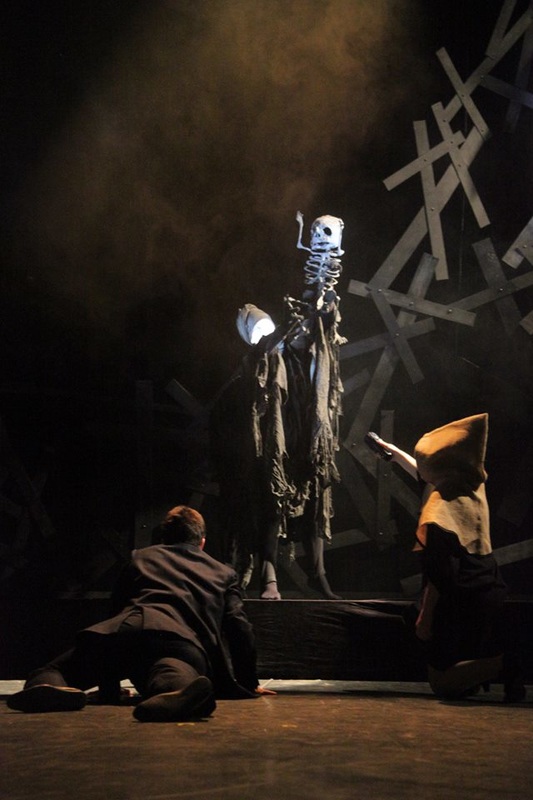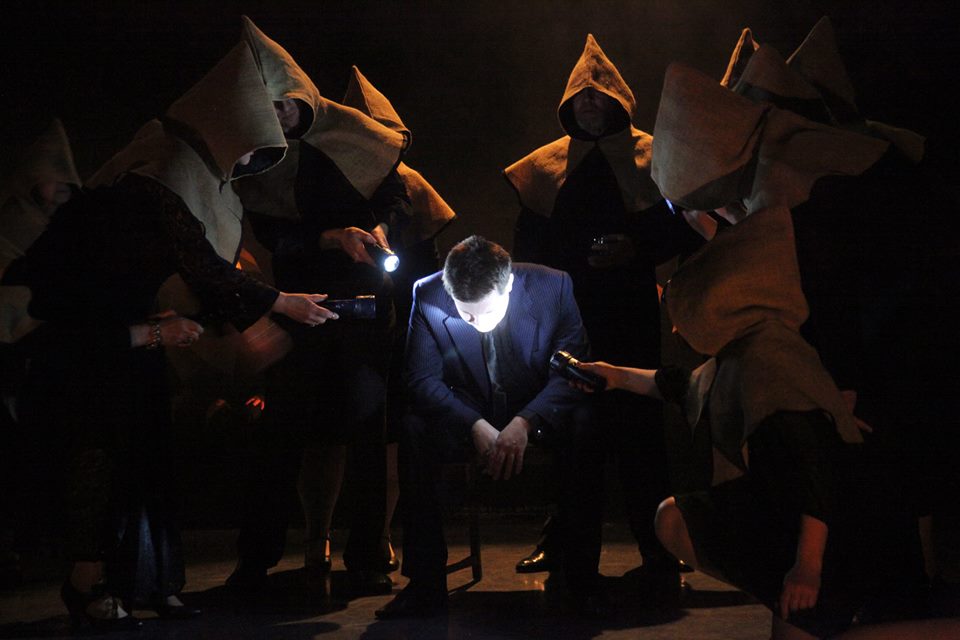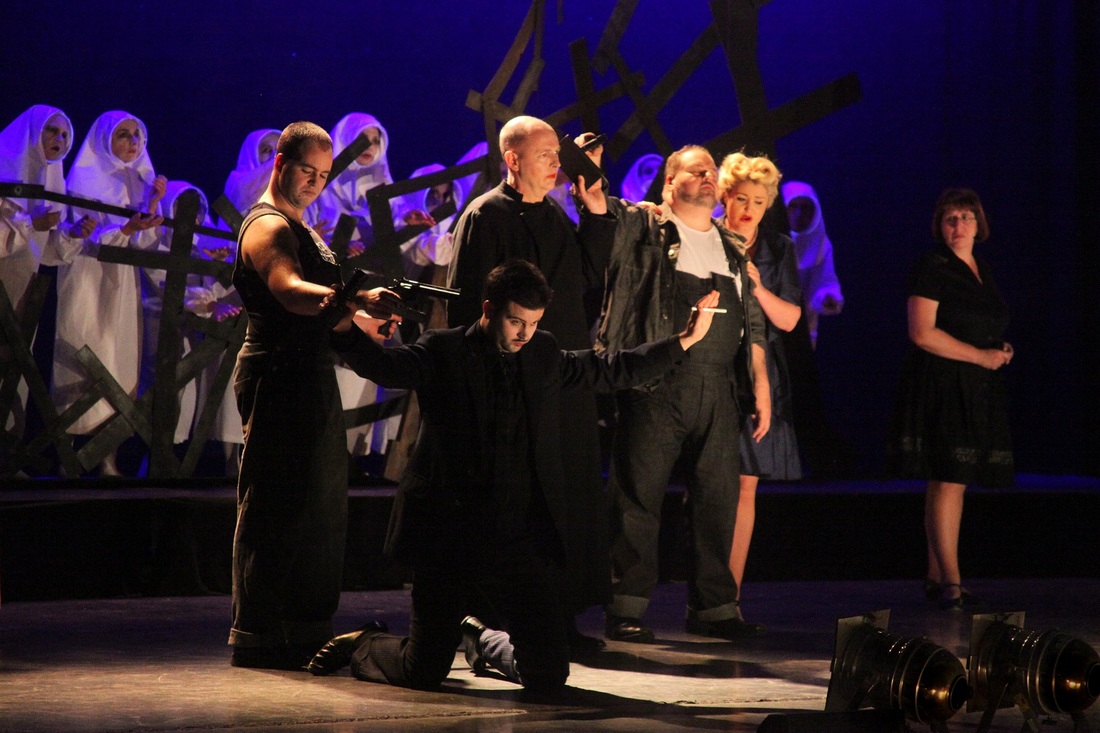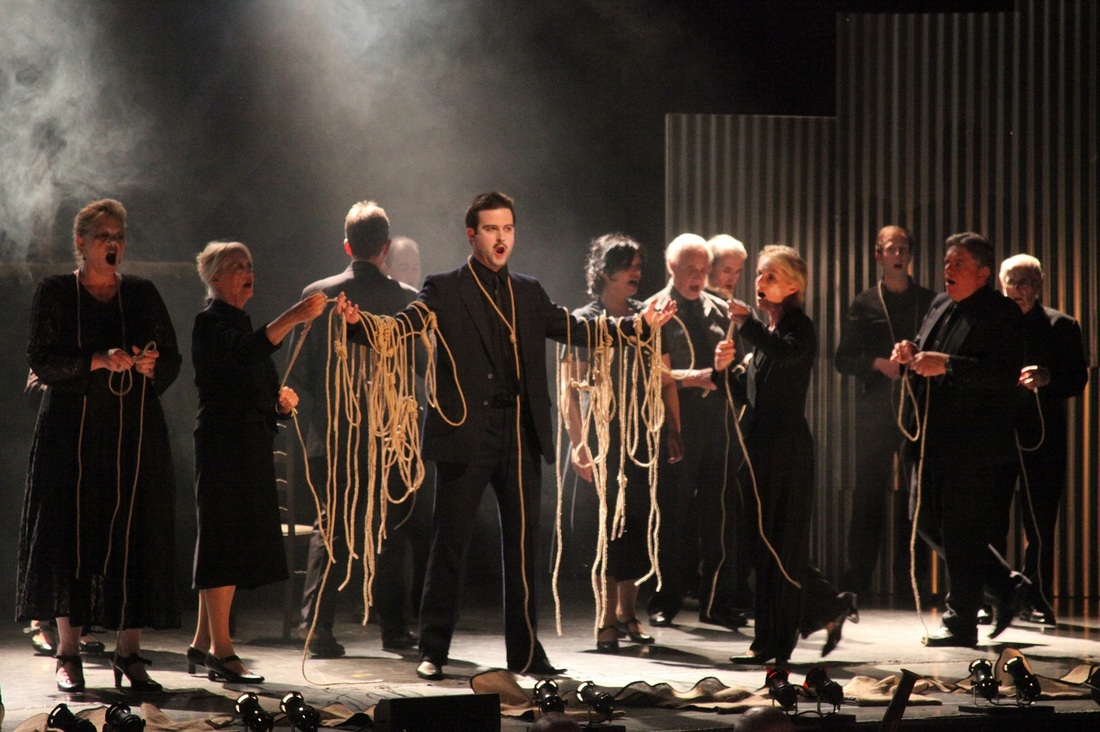Il Trovatore - Friday 24th and Saturday 25th April 2015
Director: Fraser Grant
Conductor: Kenneth Roberts
Conductor: Kenneth Roberts
Verdi's Il Trovatore production performances will be at The White Rock Theatre, Hastings, on April 24th and 25th at 7.30pm.
Director Fraser Grant once again brings his gifted expertise to the company for what will be a very different production to his last for us.
Director Fraser Grant once again brings his gifted expertise to the company for what will be a very different production to his last for us.
|
Welcome to the darkness.
An old gypsy, accused of bringing illness to a Count's baby brother, is burnt alive at the stake. In revenge her daughter seizes the child and throws it onto the pyre. Years later events are drawn to an inexorable conclusion as both the Count and the gypsy's son- a troubadour- vie for the affections of the same girl. Set almost entirely at night, Il Trovatore explores the themes of revenge and persecution. It is certainly one of Verdi's darkest operas, and, with a wonderfully memorable score, one of his most popular. Principal Cast list
Booking information
Ticket prices:
The Box Office is open now!
Directors Note
The thing that struck me most when embarking upon this project was the fact that Il Trovatore is set almost exclusively at night-with scenes lit only by moonlight, torches or fires. This gloom and darkness is reflected in the plot; it is a tale of execution and revenge; of hatred and persecution. At the top of the opera Ferrando terrifies the assembly with his tale of the witch and her curse – how she appears as a flaming owl spreading disease and misery on all who see her. There then follows a plot wherein all the protagonists are haunted in some way or other: Azucena is haunted by the sight of her own mother burning alive, and by her dreadful act of infanticide; Di Luna by the sight of his brother’s skeleton burning on the embers, by his unquenchable lust for Leonora and by his hatred for another race; Manrico by Azucena’s revelation that he may not be her son; Leonora by her obsession with death.
It was with this in mind that my production team and I decided to set the opera in a world of darkness –black scenery, black costumes, stark and minimal lighting to give the feel of a Gothic thriller. ‘Il Trovatore’ means ‘The Troubadour’ and for me the real troubadour of the piece is Verdi. He has given us an opera which allows the singers to sing their hearts out expressing their innermost thoughts. Much of the first two acts revolves around characters relating the past events which lead to curtain up. So we wanted focus on these stories being told without cluttering up an already complicated plot. To give some context to our narration we chose the look and feel of Southern States America in the first half of the 20th Century. For me, this seemed to give a real clarity to the horrors that these characters unleash on each other through their fear and quest for vengeance. Welcome to darkness. |
Link to full Press Release...
Make a weekend of it in HastingsThere's lots of hotel choice in the area. Most convenient to the White Rock Theatre is the White Rock Hotel next door. They are now offering ticket holders for either nights a 20% discount on their advertised prices if you stay for at least two nights. This offer also applies to performers or those involved in the production. Telephone the White Rock Hotel on 01424 422 240 and ask for this 20% discount for those involved in the Opera South East production at the Theatre next door.
Alternative accommodation suggestions can be found here:
Video Clip from SitzprobeMari Wyn Williams singing from Act IV of Il Trovatore with the Sussex Concert Orchestra - Monday 20th April. Recorded on an iPhone without a proper mic but OK actually! If the video picture is not buffering well then we suggest you download the video and play it locally for best results - free to download for non-commercial purposes (copyright OSE 2015)
|

Fraser Grant (Director)
Fraser studied French at Edinburgh University and trained as a director at Drama Studio London. After five years as artistic director of the Drayton Court Theatre Company, he went on to become head of Music Theatre at The London College of Music and Media as well as Head of Drama at the Junior College. He is now Head of Drama at Harvington Prep School in Ealing coupling this with a continuing career in professional Opera and Music Theatre directing. Fraser has Directed 16 operas for Opera South East, many for Oyster Opera, LCMM, Unicorn Theatre, and has been Theatre Director for productions of many plays in the UK and Italy. Amongst his works he has won several awards for Best Production on the Edinburgh Fringe. He also works as a lyricist and translator, frequently collaborating with the cabaret duo Opera Tottie. A fuller biography of Fraser can be found here... |
Biographies
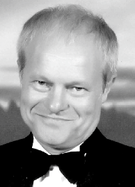
Kenneth Roberts (Conductor/Musical Director)
Ken was a founding member of OSE (or it's forerunner) in 1980 and has been supporting OSE since then. He was born in Hastings and educated at York University where he gained BA and MA degrees in music. He works as Musical Director for numerous companies at home and abroad. He has played and conducted at many prestigious venues including The Royal Albert Hall, The Festival Hall, The Britten Theatre, Kensington Palace and Hampton Court. His second opera, Mister Butterfly, which he wrote in 1994 was premièred in Hong Kong and subsequently performed at the Edinburgh Festival, he has featured in a BBC documentary, and enjoys various lecture recitals.
In recent years he has been commissioned to write & direct musicals in New Hampshire, USA, and award-winning productions in New England, commissions from the Purcell School in association with the Vaughan-Williams Trust, and commissioned to write a ballet. Recently he become a BIFF adjudicator and also lectures part time for the WEA.
A fuller biography of Ken can be found here...
Ken was a founding member of OSE (or it's forerunner) in 1980 and has been supporting OSE since then. He was born in Hastings and educated at York University where he gained BA and MA degrees in music. He works as Musical Director for numerous companies at home and abroad. He has played and conducted at many prestigious venues including The Royal Albert Hall, The Festival Hall, The Britten Theatre, Kensington Palace and Hampton Court. His second opera, Mister Butterfly, which he wrote in 1994 was premièred in Hong Kong and subsequently performed at the Edinburgh Festival, he has featured in a BBC documentary, and enjoys various lecture recitals.
In recent years he has been commissioned to write & direct musicals in New Hampshire, USA, and award-winning productions in New England, commissions from the Purcell School in association with the Vaughan-Williams Trust, and commissioned to write a ballet. Recently he become a BIFF adjudicator and also lectures part time for the WEA.
A fuller biography of Ken can be found here...

Mari Wyn Williams (Leonora)
Hailing from Llanberis North Wales and now residing in Cardiff, Mari Wyn Williams completed a Post Graduate Diploma in Vocal Studies whilst attending the Royal Welsh College of Music and Drama with Suzanne Murphy, and then accepted a position with Radio Cymru within the BBC as a production assistant, whilst continuing vocal technique under Gail Pearson. Mari completed a Masters Degree at the Welsh International Academy of Voice, achieving distinction, under the tuition of Dennis O’Neill and Nuccia Focile. Mari performed on Welsh Television at the Llangollen Pavilion alongside Gwyn Hughes Jones for the 1000’s of Christmas voices concert, and singing at the closing concert of the National Eisteddfod alongside Bryn Terfel. Mari has been invited to perform at, for instance, Strauss’ 4 Last Songs at Westminster Abbey, the Waldorf Astoria in New York, the British embassy in Paris and an opera gala in Hong Kong. In 2013, Mari performed at the Wales Millennium Centre alongside Dame Kiri Te Kanawa, Dennis O'Neill, and Jason Howard, and performed for Opera Classica Europa singing Elisabetta from Don Carlos in an open air Verdi Opera Gala in Frankfurt. On the competition circuit Mari won third place at the Montserrat Caballe Competition in Zaragoza, was a finalist in the Stuart Burrows Competition and was a Semi Finalist in the 52nd Vinas Competition in Barcelona. Last Year she made her role debut as Lady Macbeth from Verdi’s Macbeth. And she has just completed a Run as Georgetta from Il Tabarro and Nella from Gianni Schicci, both with Fulham Opera. A fuller biography of Mari can be found here... |

Roberto García López (Manrico)
Roberto was born in Buenos Aires, Argentina. He studied singing with Prof. Carmen Favre at the Instituto Superior de Arte del Teatro Colón and at the National Conservatoire “Carlos López Burchardo”. He also studied repertoire with Prof. Rozita Zozulia of the Instituto Superior de Arte del Teatro Colon. Roberto continued his voice studies in England at the Royal Northern College of Music and is currently studying vocal technique with Paul Farrington (Covent Garden), and working with coaches such as Steve Wood (Welsh National Opera), Mark Packwood (Covent Garden), Jacqueline Bremar, Ludmilla Andrew and Anthony Roden. Roberto sang the role of The Elderly Gentleman in RNCM’s production of Exposition of a Picture by Stephen Oliver, Steva in RNCM’s Jenufa, Jenik in Smetana’s The Bartered Bride for Opera 74, Bacco and Un Soldato in Cesti’s Il Pomo D’Oro in Italy, at the Batignano Summer Festival, Nadir for Edinburgh Grand Opera in The Pearl Fishers at the Edinburgh Festival Theatre, Don Carlos and Dick Johnson (La Fanciulla del West) for the RNCM, Cavaradossi for both Heritage Opera and Candlelight Opera, Jontek (Moniuszko’s Halka) for Heritage Opera, Alfredo for both Heritage Opera and Candlelight Opera and Pinkerton for Heritage Opera. Roberto has also appeared on the concert platform. He has sung Britten’s St. Nicholas Cantata, Haydn’s Great Organ Mass, Theresienmesse and Nelson Mass, Beethoven’s Missa Solemnis (Mass in D), Hiawatha’s Wedding Feast, excerpts from Tippet’s A Child of Our Time, Dvorak’s Stabat Mater, Handel’s Judas Maccabeus and Mozart’s Requiem. He has also sung Beethoven’s Ninth Symphony with Iceni Orquestra. A fuller biography on Roberto can be found here... |

Andrew Mayor (Count di Luna)
Andrew Mayor was born in Manchester, he first qualified as a solicitor and then won a postgraduate scholarship to the Royal Academy of Music to study singing. During his studies he sang Borilée in Rameau’s Les Borèades, conducted by Roger Norrington.
At the 2002 Osterfestpiele in Salzburg Andrew was a soloist in Beethoven’s Choral Fantasia at the Grossesfestspielhaus with the Berlin Philharmonic Orchestra conducted by Claudio Abbado. Other rôles include Silvio (I Pagliacci) for Castleward Opera, The Vicar (Albert Herring), Masetto (Don Giovanni) and Ford (Falstaff), for English Touring Opera, the Count (Le Nozze di Figaro), Rigoletto, Eugene Onegin and Renato in Un Ballo in Maschera all at the Holland Park Festival. Internationally,
Andrew took part in a nationwide tour of the USA performing Danilo (Die lustige Witwe) for Columbia Artists. Other recent international engagements have occurred in Kuala Lumpur (Germont, La Traviata), Penang (Escamillo, Carmen), concerts in Tokyo, Osaka, Kyoto, a tour throughout Europe singing the title rôle in Rigoletto for Compagnia d’ Opera Italiana di Milano and a tour throughout the UK singing the Count in Mozart’s Le Nozze di Figaro.
A fuller biography on Andrew can be found here...
Andrew Mayor was born in Manchester, he first qualified as a solicitor and then won a postgraduate scholarship to the Royal Academy of Music to study singing. During his studies he sang Borilée in Rameau’s Les Borèades, conducted by Roger Norrington.
At the 2002 Osterfestpiele in Salzburg Andrew was a soloist in Beethoven’s Choral Fantasia at the Grossesfestspielhaus with the Berlin Philharmonic Orchestra conducted by Claudio Abbado. Other rôles include Silvio (I Pagliacci) for Castleward Opera, The Vicar (Albert Herring), Masetto (Don Giovanni) and Ford (Falstaff), for English Touring Opera, the Count (Le Nozze di Figaro), Rigoletto, Eugene Onegin and Renato in Un Ballo in Maschera all at the Holland Park Festival. Internationally,
Andrew took part in a nationwide tour of the USA performing Danilo (Die lustige Witwe) for Columbia Artists. Other recent international engagements have occurred in Kuala Lumpur (Germont, La Traviata), Penang (Escamillo, Carmen), concerts in Tokyo, Osaka, Kyoto, a tour throughout Europe singing the title rôle in Rigoletto for Compagnia d’ Opera Italiana di Milano and a tour throughout the UK singing the Count in Mozart’s Le Nozze di Figaro.
A fuller biography on Andrew can be found here...

Barnaby Beer (Ferrando)
Barnaby Beer studied French and German at Bristol University. He has performed frequently for Opera South East, and his roles have included Marco/Gianni Schicchi, Colline/La Boheme, Captain Corcoran/HMS Pinafore and most recently Zuniga/Carmen. He has performed twice for Hampstead Garden Opera: firstly as Showman/Sergeant in Hugh the Drover, for which his performance garnered great critical acclaim, and secondly as Don Alfonso in Cosi fan Tutte, which won Best Opera Production in the 2012 Off West End Theatre Awards. Other operatic roles include Mandarin/Turandot, Mr. Gobineau/The Medium and Ben/The Telephone. He has also sung the role of Benoit/La Bohème for the silent Opera at the Vault Festival in London. On the concert platform he is a regular soloist with the Bexhill Choral Society, and his repertoire includes Haydn's Creation, Mozart's Requiem and Bach's St. John Passion. He has performed recitals in Sussex, Devon and London. In July he makes his title role debut as Don Giovanni for Summertime Opera in London. A fuller biography on Barnaby can be found here... |

Julia Bovee (Inez)
Julia has been singing with Opera South East for the past ten years, and has studies singing locally with Elizabeth Ramsay. She has been cast in many principal roles over the last few years with some of her favourites being Clorinda in La Cenerentola, Anna in Nabucco, Diana in Orpheus in the Underworld and most recently as Frasquita in Carmen, enabling her to release her inner gypsy!
She is also the company's costume designer and maker.
A fuller biography of Julia can be found here...
Julia has been singing with Opera South East for the past ten years, and has studies singing locally with Elizabeth Ramsay. She has been cast in many principal roles over the last few years with some of her favourites being Clorinda in La Cenerentola, Anna in Nabucco, Diana in Orpheus in the Underworld and most recently as Frasquita in Carmen, enabling her to release her inner gypsy!
She is also the company's costume designer and maker.
A fuller biography of Julia can be found here...
Synopsis of the plot, act by act
The synopsis of an opera is always worth reading before a performance, so here it is (and do buy a programme on the night!)
Act 1: The Duel “Attention! Attention!”
Ferrando, a captain for Count Di Luna recounts the terrible story of a gypsy woman who was burned at the stake years ago for bewitching the Count’s infant brother. The gypsy’s daughter then took revenge by kidnapping the boy and—so the story goes—throwing him into the flames where her mother had died. The charred skeleton of a baby was discovered there and the Count’s father died of grief soon after. No trace was ever found of the daughter, but the Count, always hoping that the remains might not have been his brother’s, has sworn to find her. It is rumoured that the ghost of the old gypsy haunts the area as an owl – cursing all those who see her.
The Count di Luna is obsessed with Leonora, a young woman, who does not return his love. An unknown troubadour has been heard serenading Leonora and the jealous Count is determined to capture and punish him. In her bedroom Leonora confesses to her companion Inez that she is in love with a troubadour who serenades her each night. After they have gone indoors, Di Luna appears in the garden, driven nearly insane with desire for Leonora. As he approaches her door, the troubadour’s song is heard in the darkness. Leonora rushes out to greet him but is seized instead by the Count. The troubadour appears and reveals his true identity; he is Manrico, leader of the gypsies. Furious, the Count challenges him to fight to the death.
Ferrando, a captain for Count Di Luna recounts the terrible story of a gypsy woman who was burned at the stake years ago for bewitching the Count’s infant brother. The gypsy’s daughter then took revenge by kidnapping the boy and—so the story goes—throwing him into the flames where her mother had died. The charred skeleton of a baby was discovered there and the Count’s father died of grief soon after. No trace was ever found of the daughter, but the Count, always hoping that the remains might not have been his brother’s, has sworn to find her. It is rumoured that the ghost of the old gypsy haunts the area as an owl – cursing all those who see her.
The Count di Luna is obsessed with Leonora, a young woman, who does not return his love. An unknown troubadour has been heard serenading Leonora and the jealous Count is determined to capture and punish him. In her bedroom Leonora confesses to her companion Inez that she is in love with a troubadour who serenades her each night. After they have gone indoors, Di Luna appears in the garden, driven nearly insane with desire for Leonora. As he approaches her door, the troubadour’s song is heard in the darkness. Leonora rushes out to greet him but is seized instead by the Count. The troubadour appears and reveals his true identity; he is Manrico, leader of the gypsies. Furious, the Count challenges him to fight to the death.
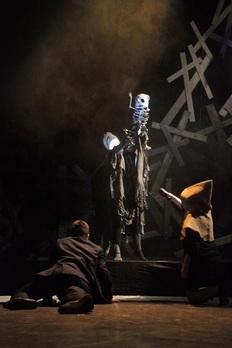
Act 2: The Gypsy
The duel has been fought, with Manrico overpowering the Count. But, strangely, some instinct stopped him from striking the blow that would have killed his rival, and he let the Count live. Manrico has been badly wounded but his mother, the gypsy Azucena, has nursed him back to health.
Azucena is the woman the Count has been looking for. Her life is scarred by the memory of her mother’s death and the terrible revenge she exacted. Manrico is determined to hear the whole truth and once the gypsy camp has moved on, she begins to tell him a horrific story. She stole the Count’s infant son but the child she murdered was in fact her own. When Manrico demands to know who he truly is, Azucena is evasive; all that matters is the maternal love she has shown him all his life and that he does not fail in his oath to take revenge on the Count. A messenger arrives with news of Leonora. Believing Manrico has died, and to escape the grasp of the Count, she is entering a convent. Azucena pleads with Manrico to stay, but he resolves to go to her immediately. Azucena sets off on a journey of her own.
(Here there will be a two minute pause)
The Count di Luna plans to storm the walls of the convent with his men and take Leonora by force. As Leonora prepares to take her vows, he tries to seize her, but is prevented by the attack of Manrico and his men. In the ensuing fight and confusion, the lovers escape.
(INTERVAL)
The duel has been fought, with Manrico overpowering the Count. But, strangely, some instinct stopped him from striking the blow that would have killed his rival, and he let the Count live. Manrico has been badly wounded but his mother, the gypsy Azucena, has nursed him back to health.
Azucena is the woman the Count has been looking for. Her life is scarred by the memory of her mother’s death and the terrible revenge she exacted. Manrico is determined to hear the whole truth and once the gypsy camp has moved on, she begins to tell him a horrific story. She stole the Count’s infant son but the child she murdered was in fact her own. When Manrico demands to know who he truly is, Azucena is evasive; all that matters is the maternal love she has shown him all his life and that he does not fail in his oath to take revenge on the Count. A messenger arrives with news of Leonora. Believing Manrico has died, and to escape the grasp of the Count, she is entering a convent. Azucena pleads with Manrico to stay, but he resolves to go to her immediately. Azucena sets off on a journey of her own.
(Here there will be a two minute pause)
The Count di Luna plans to storm the walls of the convent with his men and take Leonora by force. As Leonora prepares to take her vows, he tries to seize her, but is prevented by the attack of Manrico and his men. In the ensuing fight and confusion, the lovers escape.
(INTERVAL)
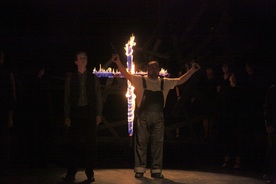 Act 4,
Act 4,
Act 3: The Gypsy’s Son
The Count and his men are about to attack the camp where Manrico has taken refuge with Leonora. Ferrando drags in Azucena, who has been captured wandering nearby. When she hears di Luna’s name, Azucena’s reactions arouse suspicion and Ferrando recognizes her as the murderer of the Count’s brother. Azucena cries out to her son Manrico to rescue her and the Count realizes that he has the means to flush his enemy out of the camp. He orders his men to build a pyre and burn Azucena.
Meanwhile Manrico and Leonora are preparing to be married. She is frightened by the imminent arrival of the Count with Manrico’s forces being outnumbered. He assures her of his love, even in the face of death. When news of Azucena’s capture reaches him, he summons his men and desperately prepares to attack.
(Here there will be a two minute pause)
The Count and his men are about to attack the camp where Manrico has taken refuge with Leonora. Ferrando drags in Azucena, who has been captured wandering nearby. When she hears di Luna’s name, Azucena’s reactions arouse suspicion and Ferrando recognizes her as the murderer of the Count’s brother. Azucena cries out to her son Manrico to rescue her and the Count realizes that he has the means to flush his enemy out of the camp. He orders his men to build a pyre and burn Azucena.
Meanwhile Manrico and Leonora are preparing to be married. She is frightened by the imminent arrival of the Count with Manrico’s forces being outnumbered. He assures her of his love, even in the face of death. When news of Azucena’s capture reaches him, he summons his men and desperately prepares to attack.
(Here there will be a two minute pause)
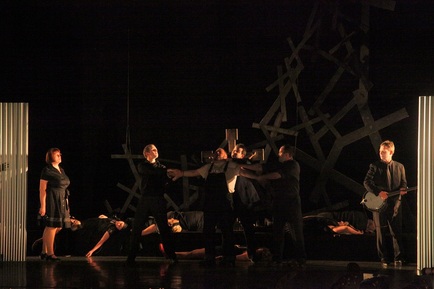
Act 4: The Execution
Manrico’s men have been defeated and he and Azucena are being held captive by the Count. Leonora has escaped with Ruiz, Manrico’s friend, and comes to the prison. She knows that he is condemned to death and prays for his salvation. The troubador’s voice is heard from the prison and the Count appears and orders the execution of both Manrico and Azucena at sunrise, Leonora offers herself to the Count in return for her lover’s life, but secretly takes a slow poison to cheat him of his prize.
Inside the prison, Manrico tries to comfort Azucena, who is terrified by visions of the stake and the fire that awaits her. He lulls her with memories of their former freedom. Leonora rushes in to tell Manrico that he is saved, urging him to escape. He understands what she has done and furiously denounces her, refusing the Count’s mercy. But the poison is already taking effect. Leonora dies in his arms. Di Luna enters the cell in time to witness her death. He sends Manrico to his execution. Azucena cries out that her mother is avenged: the Count has killed his own brother.
Manrico’s men have been defeated and he and Azucena are being held captive by the Count. Leonora has escaped with Ruiz, Manrico’s friend, and comes to the prison. She knows that he is condemned to death and prays for his salvation. The troubador’s voice is heard from the prison and the Count appears and orders the execution of both Manrico and Azucena at sunrise, Leonora offers herself to the Count in return for her lover’s life, but secretly takes a slow poison to cheat him of his prize.
Inside the prison, Manrico tries to comfort Azucena, who is terrified by visions of the stake and the fire that awaits her. He lulls her with memories of their former freedom. Leonora rushes in to tell Manrico that he is saved, urging him to escape. He understands what she has done and furiously denounces her, refusing the Count’s mercy. But the poison is already taking effect. Leonora dies in his arms. Di Luna enters the cell in time to witness her death. He sends Manrico to his execution. Azucena cries out that her mother is avenged: the Count has killed his own brother.

